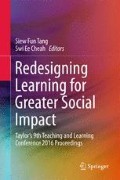Abstract
Massive open online course (MOOCs) are transforming the era of distance learning education in a groundbreaking way that it has attracted a huge amount of attention from the media, education institutions, and education professionals. The purpose of this study is to measure the effectiveness of courses delivered using MOOCs in Taylor’s University. The Kirkpatrick’s four levels of evaluation learning model were adapted to measure the effectiveness of MOOCs. A descriptive survey of 250 learners was conducted. The study indicated that comprehensive study materials in MOOCs are useful for the learners as future reference. MOOCs are effective in the sense that it helps learners to understand a certain topic and apply it in real life. The program has met the learners’ expectations, and they will strongly recommend the course to other people. Nevertheless, learners think that the study materials are sufficient for beginners, but advanced course is needed to meet their future job expectation. This study focuses on MOOCs in OpenLearning platform only. In the future, research can be expanded to focus on different MOOC platforms besides OpenLearning. Lastly, with the result obtained in this research, it will be able to contribute to the community of MOOC and institutions that plan to introduce MOOCs.
Access this chapter
Tax calculation will be finalised at checkout
Purchases are for personal use only
References
Ari, M.B. (2013). MOOCs on introductory programming, ACM Inroads, 4(2).
Ayub, E., & Lim, C.L. (2016). Developing a pedagogy framework for institution-wide implementation of MOOC: A case study from a Malaysian Private University. Manuscript submitted for publication.
Chen, Y.-H., & Chen, P.-J. (2015). MOOC study group: facilitation strategies, influential factors and student perceived gains. Computers & Education, 86, 55–70.
Chua, Y. P. (2012). Mastering research methods. Kuala Lumpur: McGrawHill Education.
Garza, L. Y., Sancho-Vinuesa, T., & Gomez Zermeno M. G. (2015). Indicators of pedagogical quality for the design of a massive open online course for teacher training. RUSC. Universities and Knowledge Society Journal, 12(1), 104–118.
Gene, O.B., Nunez, M.M., & Blanco, A.F. (2014). Gamification in MOOC: Challenges, opportunities and proposals for advancing MOOC model. In TEEM 2014, Salamanca, Spain (pp. 215–220), October 01–03, 2014
Goh, W. W., Kaur, S., & Chion, Z. H. (2015). The Perceptions of MOOC Among learners based on activity theory. In Taylor’s 7th Teaching and Learning Conference 2014 Proceedings, (pp. 331–340).
Gomez-Zermeno, M. G., & Garza, L. A. (2016). Research analysis on MOOC course dropout and retention rates. Turkish Online Journal of Distance Education, 17(2), 3–14.
Grosseck, G., Holotescu, C., Bran, R., & Ivanova, M. (2015). A checklist for a MOOC activist. In The 11th International Scientific Conference eLearning and Software for Education, April, 23-24, Bucharest, 538-543.
Hew, K. F., & Cheung, W. S. (2014). Students’ and instructors’ use of massive open online courses (MOOCs): motivations and challenges. Educational Research Review, 12, 45–58.
Ji, Z. (2016). Application and empirical investigation of new MOOC teaching system in computer application course. International Journal of Emerging Technologies in Learning, 11(5), 62–67.
Malligan, C., Littlejohn, A., & Hood, N. (2016). Learning in MOOCs: A comparison study. In Proceedings of the European Stakeholder Summit on experiences and best practices in and around MOOCs (EMOOCS), Austria (pp. 15–26), February 22–24, 2016.
Mansor, F., Latifah, A. L., & Tengku Amina, M. (2015). MOOCs in Malaysia: A preliminary case study. In E-ASEM Forum: Renewing the lifelong learning agenda for the future, Bali, Indonesia (pp. 1–17), March 10-11, 2015.
Ministry of Education Malaysia (2015). Malaysian education blueprint on higher education—shift 10: Globalized Online Learning.
Muhstak, A-A. (2014). Entrepreneurship: The first MOOC in Malaysia.
Munoz-Merino, P. J., Ruiperez-Valiente, J. A., Alario-Hoyos, C., Perez-Sanagustin, M., & Kloos, C. D. (2015). Precise effectiveness strategy for analyzing the effectiveness of students with educational resources and activities in MOOCs. Computers in Human Behavior, 47, 108–118.
Nor Fadzleen, S. D., Rose, A. A., & Naoki, O. (2015). Stakeholders’ view on MOOCs sustainability in Malaysian higher education: A preliminary study. ARPN Journal of Engineering and Applied Sciences, 10(23), 18104–18112.
Nunez, M. M., Gene, O. B., & Blanco, A. F. (2014). Social community in MOOCs: Practical implication and outcomes. In TEEM 2014, Salamanca, Spain (pp. 147–154), October 01–03, 2014.
Ratnaria, W., Azizudin, M. S., Bakri, M., Muhammad, S., & Khaliza, S. (2015). Sharing works and copyright issues in Massive Open Online Courseware (MOOC). International Journal for Research in emerging science and technology, 2(10), 20–29.
Rolfe, V. (2015). A systematic review of the socio-ethical aspects of massive online open courses. European Journal of Open, Distance and e-Learning, 18(1), 52–72.
Terras, M. M., & Ramsay, J. (2015). Massive Open Online Courses (MOOCs): Insights and challenges from a psychological perspective. British Journal of Educational Technology, 46(3), 472–487.
Yuan, L., & Potwell, S. (2013). MOOCs and open education: Implications for higher education. UK: JISC Cetis.
Author information
Authors and Affiliations
Corresponding author
Editor information
Editors and Affiliations
Rights and permissions
Copyright information
© 2018 Springer Nature Singapore Pte Ltd.
About this paper
Cite this paper
Goh, W.W., Wong, S.Y., Ayub, E. (2018). The Effectiveness of MOOC Among Learners Based on Kirkpatrick’s Model. In: Tang, S., Cheah, S. (eds) Redesigning Learning for Greater Social Impact. Springer, Singapore. https://doi.org/10.1007/978-981-10-4223-2_29
Download citation
DOI: https://doi.org/10.1007/978-981-10-4223-2_29
Published:
Publisher Name: Springer, Singapore
Print ISBN: 978-981-10-4222-5
Online ISBN: 978-981-10-4223-2
eBook Packages: EducationEducation (R0)

